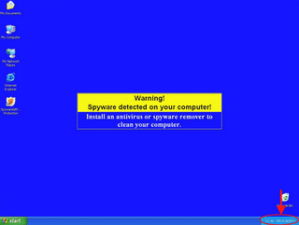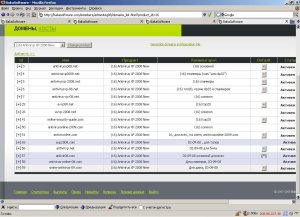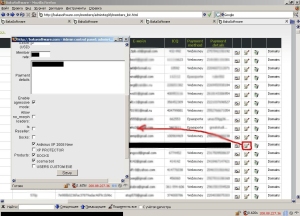Posts Tagged ‘Bakasoftware’
Fake Anti-Virus Brings in 158 000$ a Week
Russian criminals who are selling a fake anti-virus, “Antivirus XP 2008/2009” among others, have made more than 150 000$ in a week, according to the Sydney Morning Herald[1]. If you ever seen those annoying popups warning you that you might be infected with one or more viruses, then you probably came across this scam.
“For most people they might just be browsing the web and suddenly they don’t know why this thing will pop up in their face, telling them they’ve got 309 infections on their computer, it will change their desktop wallpaper, change their screen saver to fake ‘blue screens of death’,” said Joe Stewart, from SecureWorks said.
The software is sold for 49.95 $US and will “detect” various viruses and Trojans on the computer. Stewart shows that Antivirus XP still has some basic anti-malware functionality, but as he explains, it’s mostly in case the authors are brought to court “they might try to claim the program is not truly fraudulent – after all, it can clean computers of at least a few malicious programs[2]“. Only 17 minor threats can be removed, far from the 102,563 viruses the anti-virus claims to clean. And don’t expect a refund for the software.
The entity behind this fraudware is called Bakasoftware, a Russian company that pays affiliates to sell its anti-virus to users. Affiliates can earn between 58% and 90% of the sale price. Criminals are therefore using everyway to trick users into installing the software, including scaring the user into believing that he is infected, even using botnets to push the program into the users’ computers.
“Since it is not hacking people’s computers and only runs the affiliate program, Bakasoftware does not have to worry about being shut down by police“, Stewart said[3].
|
Affiliate ID |
Affiliate Username |
Account Balance (USD) |
| 4928 | nenastniy | $158,568.86 |
| 56 | krab | $105,955.76 |
| 2 | rstwm | $95,021.16 |
| 4748 | newforis | $93,260.64 |
| 5016 | slyers | $85,220.22 |
| 3684 | ultra | $82,174.54 |
| 3750 | cosma2k | $78,824.88 |
| 5050 | dp322 | $75,631.26 |
| 3886 | iamthevip | $61,552.63 |
| 4048 | dp32 | $58,160.20 |
| Table 1.0 – Top earners in the Bakasoftware Affiliate Program[4] | ||
Screenshots took from the administrative panel of bakasoftware.com which was hacked by NeoN:
(Screenshots are from “Rogue Antivirus Dissected – Part 2”, Joe Steward, SecureWorks, October 22, 2008, http://www.secureworks.com/research/threats/rogue-antivirus-part-2/?threat=rogue-antivirus-part-2)
By the time of this writing, http://www.bakasoftware.com/ was not accessible. Another interesting fact, if the Russian language is installed on your computer, there’s a good chance you won’t be considered as a target because of Russian legislation. Apparently the creators have been sued anyway[5].
Many other fraudware are available, always proposing anti-malware software. Their ads are oven seen on torrents, warez and cracks/serials sites. What’s particularly dangerous is that they can come with other legitimate software or by drive-by downloads. Once they are installed in your computer, they get annoying very fast and can trick you into buying fraudware. Popups can appear that you are infected. Other types of fraudware are those “boost your computer” software.
P.S “baka” means “stupid” in Japanese. A totally appropriate title for the operators of this company.
See also:
“Fake software nets hacker $158,000 in a week”, Stewart Meagher, The Inquirer, November 5, 2008, http://www.theinquirer.net/gb/inquirer/news/2008/11/05/fake-antivirus-nets-hacker-150 (accessed on November 5, 2008)
“Antiviral ‘Scareware’ Just One More Intruder”, John Markoff, The New York Times, October 29, 2008, http://www.nytimes.com/2008/10/30/technology/internet/30virus.html (accessed on November 5, 2008)
“Crooks can make $5M a year shilling fake security software”, Gregg Keizer, ComputerWorld, October 31, 2008, http://computerworld.com/action/article.do?command=viewArticleBasic&taxonomyName=security_hardware_and_software&articleId=9118778&taxonomyId=145&intsrc=kc_top (accessed on November 5, 2008)
[1] “Russian scammers cash in on pop-up menace”, Asher Moses, The Sydney Herald, November 4, 2008, p.1, http://www.smh.com.au/news/technology/security/russian-scammers-cash-in-on-popup-menace/2008/11/04/1225560814202.html (accessed on November 5, 2008)
[2] “Rogue Antivirus Dissected – Part 1”, Joe Stewart, SecureWorks, October 21, 2008, http://www.secureworks.com/research/threats/rogue-antivirus-part-1/?threat=rogue-antivirus-part-1 (accessed on November 5, 2008)
[3] “Russian scammers cash in on pop-up menace”, Asher Moses, The Sydney Herald, November 4, 2008, p.2, http://www.smh.com.au/news/technology/security/russian-scammers-cash-in-on-popup-menace/2008/11/04/1225560814202.html (accessed on November 5, 2008)
[4] “Rogue Antivirus Dissected – Part 2”, Joe Steward, SecureWorks, October 22, 2008, http://www.secureworks.com/research/threats/rogue-antivirus-part-2/?threat=rogue-antivirus-part-2 (accessed on November 5, 2008)
[5] “Infamous vendor of “AntiVirus XP” badware sued”, Adam O’Donnell, ZDNet, September 30th, 2008, http://blogs.zdnet.com/security/?p=1980 (accessed on November 5, 2008





